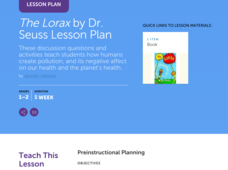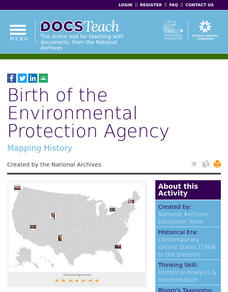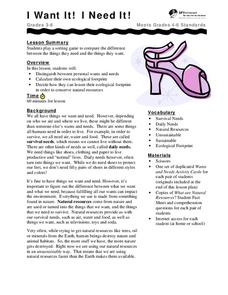Scholastic
The Lorax by Dr. Seuss Lesson Plan
Celebrate the whimsical world of Dr. Seuss with a lesson that features the memorable tale of The Lorax. After listening to a riveting read-aloud, scholars take part in a grand conversation about the story and environment. Then they...
Rainforest Alliance
Protecting the Critical Habitat of the Manatee and Loggerhead Turtle
Explore ocean habitats with a lesson that showcases the home of manatees and loggerhead turtles in Belize. Here, pupils compare and contrast the homes of ocean animals to those of humans, listen to an original short story about the...
Curated OER
Climate Change
Rising sea levels, strong storms, melting ice ... who or what is to blame? Scholars browse the website in preparation for a class discussion or debate about whether human activity is causing climate change. They gain a balanced...
NOAA
Sustaining Our Ocean Resources
Lead young scientists on an investigation of fishery practices with the final installment of this four-part unit. Using a PowerPoint presentation and hands-on simulation, this instructional activity engages children in learning how fish...
Texas Commission on Environmental Quality
Environmental Sciences
Whether you are teaching environmental science in junior high or studying recycling in kindergarten, there is something for all in this set of lessons designed for environmental education. The 110-page packet comes with tips for teaching...
British Council
21st Century Jobs
Let's get to work! Using the resource, pupils discover some of the environmental impacts of the workplace, completing a worksheet on 21st-century jobs. Next, they work in small groups to collaboratively write four ideas about the future...
Project WET Foundation
Explore Watersheds
What makes a watershed? What are the natural and human features of a watershed? How do human features affect watersheds? Where can I find my local watershed? These questions are thoroughly explained in an informative watershed interactive.
DocsTeach
Birth of the Environmental Protection Agency
Seeing is believing when it comes to climate change. An informative activity explores the creation of the Environmental Protection Agency (EPA) and its efforts to document environmental issues with photographs. Academics match images...
NPR
Investigate the Plastic Problem
Plastics are forever. The second lesson plan in a 10-part unit has pupils research the effects of plastics on the environment. They present their findings by creating an infographic.
Channel Islands Film
Santa Cruz Island - Writing for Information
After re-viewing a documentary segment on the restoration of Santa Cruz Island,, individuals craft an essay in which they compare the views of the various stake holders featured in the video and identify the point of view they find the...
Core Knowledge Foundation
Ecology Tell It Again!™ Read-Aloud Anthology
A read-aloud anthology provides informational texts about ecology to boost reading comprehension. Third-graders listen and discuss readings where they answer questions and focus on vocabulary. Pupils complete extension activities,...
Wilderness Classroom
Pollution
Educate scholars on pollution—air, water, and land—with a series of lessons that begin with a thorough explanation of each type. Learners then take part in three activities to reinforce the importance of reducing pollution. They...
Scholastic
Study Jams! Natural Resources
Use this slide show to introduce your class to some of our most useful natural resources. The text beneath the photographs differentiates between renewable and non-renewable resources. The need for conservation of resources and human...
Science 4 Inquiry
Deforestation
Young scientists observe deforestation from satellite photos and discuss the importance of forests to the global environment. They then simulate a plot of forest when farmers move into the area over the course of seven years. Finally,...
City and County of San Francisco
I Want It! I Need It!
Discuss wants and needs with your elementary ecologists and get them to consider what would happen to our natural resources if we all got everything that we want. Learners play a card sorting game and take an ecological footprint quiz on...
Practical Action
Climate Change - Who's In Control?
How can both individuals and governments respond to climate change and take responsibility to reduce its effects on our environment? Here you will find three lessons filled with discussion, debate, and role-playing...
Teacher Created Resources
Problem and Solution: By Jove, I Think You've Got It
Through grand conversation, help scholars identify issues that harm the Earth and find solutions on how to solve them. After voting—on what your class deems the most important problem—stretch writing muscles with a problem-solution essay...
British Council
Family Footprint
Working in small groups, pupils design a questionnaire to survey classmates about their carbon footprints. Then, after discussing the activity with group members, they share with the class an interesting fact they learned.
Curated OER
The Chesapeake Bay in Captain John Smith's Time
When Captain John Smith visited the Chesapeake Bay in the summer of 1608, what types of animals and habitats did he encounter? Your young historians will analyze primary source documents to answer this question, as well as compare the...
Beyond Benign
Decision Graphic Introduction
E is for economics, environment, and social equity. The fifth installment of a 15-part series has scholars first considering ecological impacts, such as determining how much water it takes to produce a can of soda. They then use decision...
British Council
Buy. Use. Toss.
Responsible consumption is never a waste of time. Using the engaging resource, scholars learn about the impact of waste on the planet, sorting trash into necessary and luxury piles. They then analyze their consumption habits, writing an...
WE Charity
High School–Module 2: Circular Economy and Nature
Everyone's heard the popular slogan reduce, reuse, recycle, but there may be a better way to talk about sustainability. Using the second lesson from the five-part WE Are Innovators—High School Modules series, learners explore issues...
Indiana Department of Education
Amusement of the Future
Take your class on the ride of their lives! Physical science scholars get an in-depth look at potential and kinetic energies in an amusement park-themed unit. Students research, design, and promote their own amusement parks, complete...
Beyond Benign
Leave Only Footprints
You don't need to tip-toe around an enlightening resource. Young environmentalists learn about ecological footprints in the fourth lesson of 15. Answering a questionnaire helps them see how their own families and homes affect the...

























